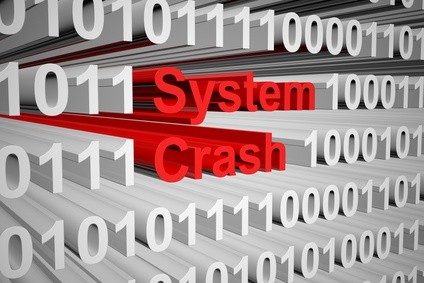Directive Blogs
The Causes of Network Crashes (and How to Avoid Them)
It should come as no surprise that a crash occurring in your computer network is a bad thing for your business. However, the real ramifications of such an event might not immediately come to mind. Fortunately, there are precautions that may be put into place that can help you to mitigate the chances of a network crash.
What Network Crashes Can Cause
Naturally, the first problem that a network crash presents is the total lack of productivity it will cause your business. After all, your staff likely relies on the network in order to access materials and resources they need in order to do their jobs. Without access, they’re left without the means to generate revenue for your business. Meanwhile, they are still contractually entitled to receive their salary for their time at work. This, combined with your operational costs, means that your cash flow during a network crash dips into the red.
A crash can also lead to data loss, and seeing as your data is one of the most valuable assets to your business operations, data loss isn’t something that can be shrugged off, as we’ve discussed before.
Furthermore, you have to also consider how your network crash may affect your clients and customers. If they rely on your network for a particular service that they cannot access, they are not going to be overly pleased with your company--and if these issues are persistent enough, these clients and customers will likely seek out another business they perceive as more reliable. Worse, they share their experiences with other potential clients, who will no longer even consider you as an option.
Clearly, network crashes are something that need to be avoided if at all possible.
Causes of Network Crashes
Unfortunately, there can be numerous causes to a network crash. Fortunately, each can be somewhat easily mitigated with the proper foresight and maintenance.
OS Issues
There’s a reason we always say to double-check if your systems can handle an update before you install it. Compatibility issues between your solutions can occur if you aren’t careful about which updates you choose to install, and you might wind up with an internal configuration conflict or worse. To avoid this, make sure you always have a trusted IT professional evaluate your solutions and the proposed update to make sure that you won’t run into any unexpected complications.
Electrical Problems
Any disruption of power to your server can lead to a crash, regardless of whether a lightning strike caused a power surge or someone tripped over the wrong cable. However, these kinds of issues can largely be avoided by utilizing an reliable power supply and practicing proper cable management.
Environmental Conditions
Or, in other words, the state of your server room. In order to function properly, your IT needs its environment to be cool and clean. Excessive heat can interfere with its operation, so the room needs to be well-ventilated and as climate-controlled as possible. Heating issues are also why your components need to be kept clean. Built-up dust can prevent heat from escaping, allowing it to build up and damage your systems.
Equipment Failure
Sometimes, things just break. Whether a component has simply gotten too old and worn out, or you just so happened to get a lemon, if it doesn’t work properly, your network will crash.
Fortunately, we can help you resolve any of these issues before they result in a crash. Give us a call at 607.433.2200 for more information.


